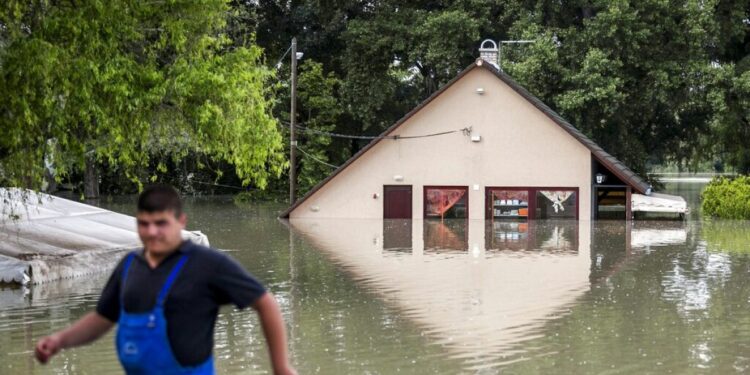“Everywhere you look, it still feels like it only just happened yesterday,” laments Feuser. The remaining damage is a clear sign of the force of the flood and slow pace of reconstruction.
Klaus Feuser’s story reflects the wider challenges facing the EU, as it grapples with the reality of natural disasters happening with increasing frequency — from floods to forest fires — which is straining existing mechanisms for relief and recovery.
Since its last revision in 2014, the EU Solidarity Fund (EUSF) has been criticised for its limited scope and slow disbursement, which often fails to meet the immediate needs of affected communities. The fund aims to restore vital infrastructure and support reconstruction.
Challenges and financial limitations of the EU Solidarity Fund
Created in 2002, the EU Solidarity Fund (EUSF) is facing increasing criticism, mainly due to financial constraints and inefficiencies. It was once a beacon of hope for regions in Europe that were affected by disasters.
With climate-related disasters occurring at an increased rate, the current financial structure of the fund is coming under pressure. Its annual budget of €500 million is considered insufficient, leading to calls from policy makers and affected communities for a fundamental overhaul of the Fund’s financial mechanisms.
In a European Climate Risk Assessment report published earlier this year, Julie Berckmans of the European Environment Agency called for reform of the Fund, among other recommendations.
Berckmans emphasised to Euronews that the fund’s resources are exhausted every year due to the sheer number and scale of climate-related events. “According to forecasts, the damage caused by coastal flooding alone could rise to €1 trillion per year by the end of the century,” she explained.
Stefan Appel, Head of the Financial Instruments Unit at the European Commission, agrees. In his opinion, the EUSF’s financial resources are insufficient when several disasters occur simultaneously.
In 2021 and 2022, floods in several EU countries exceeded the Fund’s budget allocations, which led to cuts in the financial aid provided. As a rule, the EUSF can only provide up to 6% of the total damage caused. The €612.6 million that Germany received corresponds to around 1.5% of the estimated €40.5 billion in damages.
“We had to cut support because there was not enough money,” Appel told Euronews.
A lack of transparency and regulations
According to Appel, the EU Solidarity Fund is not designed to be an emergency fund, but rather a solidarity mechanism that is subject to complex administrative procedures.
“Even if everything runs smoothly, it takes at least four months from application to disbursement,” he explained. This delay, exacerbated by the assessment processes required to authorise funds, is often at odds with the immediate financial needs that follow disasters.
The bureaucratic complexity of the EUSF not only slows the disbursement process, but also complicates transparency and accountability.
ADVERTISEMENT
The “shared management” of the fund means that while the EU framework is set, actual implementation is managed by national and regional authorities.
This can lead to significant differences in how the funds are utilised and reported. This often leaves local beneficiaries, such as restaurant owner Klaus Feuser, frustrated. “When there are funds provided, we have no idea where they go,” he tells Euronews.
This transparency problem becomes even more serious when funds are misdirected or withheld at higher levels of government, such as in a recent scandal uncovered in Germany.
In July 2023, it was revealed that €612.6 million intended for flood victims in regions such as Rhineland-Palatinate and North Rhine-Westphalia had not been passed on to the affected municipalities. Instead, they remained in the federal budget.
ADVERTISEMENT
This misallocation of funds drew sharp criticism from local and regional authorities, and revealed a substantial gap between the allocation of EU funds and the actual needs on the ground.
Stefan Appel from the European Commission also recognises these challenges, saying: “It is unfortunate that it is unclear to people where the money is going.” For him, this emphasises the urgent need for more transparency and accountability in dealing with the EUSF.
A long road fraught with bureaucratic hurdles
The EUSF’s regulations make reconstruction even more difficult, as funds may not necessarily be used to improve infrastructure resilience, a principle known as “Build Back Better”.
Current regulations limit funding to immediate reconstruction. They often do not include improvements that would make structures more resilient to future disasters. This regulatory framework hinders the EU’s ability to not only respond effectively to disasters, but also to proactively improve infrastructure.
ADVERTISEMENT
The recent floods in Germany, Italy and Spain show how crucial the EU Solidarity Fund is for crisis management in Europe. After severe floods hit Bavaria, Baden-Württemberg and the Aosta Valley in May and June this year, the Commission made €116 million available in response. Around €112 million of that amount will go to Germany, and just under €4 million to Italy.
The regions of Emilia-Romagna and Tuscany, which were affected by severe flooding last year, are now also receiving support. However, these sums represent only a fraction of the billions in damage caused.
Currently, Spain is also waiting for support to be provided.
This year’s European elections offer a glimmer of hope
This year’s European elections offered cause for optimist that reforms to the Solidarity Fund could yet be imminent.
ADVERTISEMENT
Indeed, a recent resolution adopted by MEPs called for an expansion of the EUSF budget in order to strengthen Europe’s resilience to climate-related disasters.
“We need to further develop a structure for dealing with extreme weather,” said Elisa Ferreira, EU Commissioner for Cohesion and Reforms. “The Solidarity Fund is a powerful sign of European togetherness, and people in affected regions can rely on this support.”
Source link : http://www.bing.com/news/apiclick.aspx?ref=FexRss&aid=&tid=67255e6acb7f4b318b24d8a530d3c44e&url=https%3A%2F%2Fwww.euronews.com%2Fmy-europe%2F2024%2F11%2F01%2Feu-solidarity-fund-why-disaster-relief-in-europe-often-comes-too-late&c=2936054710707235391&mkt=de-de
Author :
Publish date : 2024-11-01 15:34:00
Copyright for syndicated content belongs to the linked Source.



